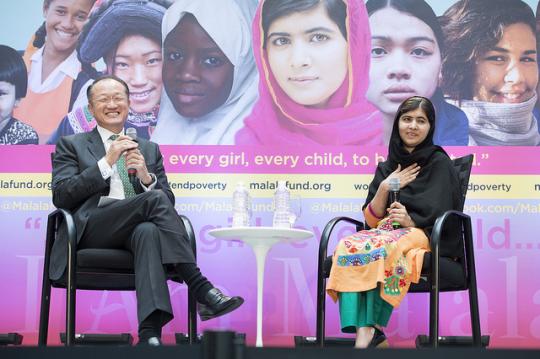
On this year’s International Day of the Girl, I was part of the vast audience in the Atrium of the World Bank who had the opportunity to hear Malala Yousafza, the young activist who is inspiring the world with her bravery and courage, speak about her passionate fight for girls’ education.
Just the night before, she had wowed Jon Stewart on his television show with her poignantly articulate and exceedingly wise responses. Among them, she said: “I believe in equality. And I believe there is no difference between a man and a woman. I even believe that a woman is more powerful than men.”
These words, though spoken by a teenager, could scarcely ring more true amid the battle to eliminate poverty. Women are indeed more powerful than men, in the sense that, when you invest in a woman, you also invest in her family, her community and her country at large.
Several newly released reports on development echo this notion. The 2014 World Development Report states that “women’s economic and social empowerment can strongly influence whether the allocation of resources within the household benefits children and promotes gender equality.” Similarly, the IFC’s Gender Program and its WINvest initiative notably begin the executive summary of their just released report by declaring, “Investing in women’s employment is key to unlocking growth in emerging and developing economies.” The IMF has also joined the conversation on women’s economic empowerment: The recently published IMF Staff Discussion Note on women, work and the economy argues strongly in favor of policies that allow women to develop their full labor-market potential. Such policies, notes the IMF, have significant macroeconomic gains for both high-income and low-income economies.
Despite the ample evidence showing that women’s economic empowerment promotes sustainable development, women all over the world face basic legal obstacles to becoming employees and entrepreneurs. The 2014 Women, Business and the Law report shows that 90 percent of 143 economies studied — covering 98 percent of the world’s population — have at least one legal difference restricting women’s economic opportunities.
Malala’s own country, Pakistan, for example, is one of 19 economies in the world that have gender-differentiated procedures for obtaining passports. It is also one of 79 economies worldwide that do not allow women to do all the same jobs as men: Pakistani women may not work in factories, the mining industry, jobs deemed hazardous, or jobs requiring lifting weights above a threshold in the same way as their male counterparts. In addition to various other industry restrictions, women in Pakistan cannot work the same night hours as men. Laws limiting women’s work hours do not only bar women from working in particular sectors, but they also have far-reaching implications for women’s representation in management positions.
Contrary to a belief that may be widespread, it’s not only developing economies like Pakistan that have legislation hindering women’s economic opportunities. The Russian Federation, a high-income economy, has more than 450 specific jobs listed in its Labor Code from which women are barred. Chile, another high-income economy, is one of only five economies covered by Women, Business and the Law in which the husband alone administers marital property under the default regime. Yet another high-income economy, the United States, does not mandate paid maternity leave. Strikingly, only two economies among the total of the 143 studied — the United States and Papua New Guinea — do not legally mandate paid leave that a mother can avail herself of.
Malala seeks to create a world where every girl can reach her full potential by ensuring that all girls have access to education. But girls eventually transform into women who, despite their education, may never be able to reach their full potential due to legal constraints on their economic prospects. Malala has helped strengthen the world’s resolve to ensure that all girls have the right to education. Let us now follow her lead and demand women’s equal access to economic opportunities before the law, as well.
Photo credit: World Bank photo


Join the Conversation